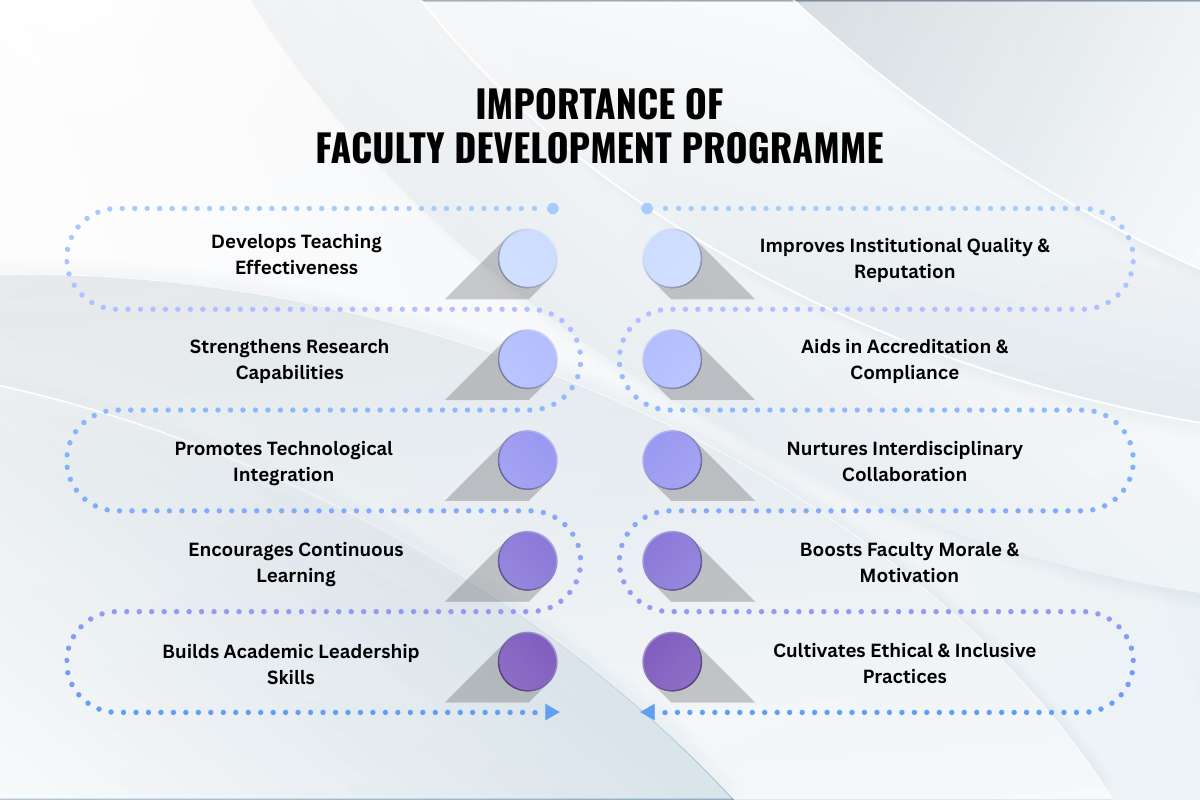How do educators stay not just current, but truly innovative? Many institutes, schools, and educational organizations face this challenging question today.
The answer lies not in static textbooks or traditional methodologies, but in a continuous journey of growth and improvement, ensuring that those who shape young minds are themselves constantly sharpening their tools and expanding their academic possibilities.
This ongoing pursuit of excellence is vital for nurturing innovation. And encouraging a truly engaging learning environment is exactly the spirit of what is often referred to as a Faculty Development Programme.
What is the Faculty Development Programme?
A Faculty Development Program (FDP) is a purposeful initiative designed to improve the skills, knowledge, and effectiveness of faculty at a university or other institution. The purpose of these programs is to assist faculty in various areas, including teaching, research, leadership, and professional development, and support a culture of lifelong learning and growth.
Advantages of the faculty development programs:

1. Improved Teaching Quality:
Improved teaching skill leads to a better instructor, which enhances student involvement.
2. Increased Research Productivity:
Enhanced support for your research and scholarship leads to higher numbers of publications, grants, and experimentation.
3. Improved Leadership Potential:
Faculty Development Programs allow the institution to develop the great leaders it can foster, leading to institutional growth and development.
4. Increased Faculty Retention:
By improving faculty members’ professional growth and development, institutions develop an environment in which faculty feel supported and engaged, and this will contribute to faculty retention.
5. Improved Student Performance:
Ultimately, the improved skills and knowledge of the faculty, improvements in faculty development programs, will lead to improved student learning and academic performance.
Importance of Faculty Development Programme:

1. Develops Teaching Effectiveness
FDPs provide teachers with creative teaching methods, collaborative-learning pedagogies, and models of curriculum development. This translates into meaningful, interactive, inclusive, and outcome-based learning opportunities for students.
2. Strengthens Research Capabilities
Faculty members develop knowledge about research designs, funding, and scholarship, enabling them to publish in high-quality journals, collaborate across disciplines, and contribute research outputs for the institution.
3. Promotes Technological Integration
Training consists of options like LMS platforms, virtual labs, data analytics, and emerging technologies like AI and AR/VR will also be factors to consider in helping educators build hybrid or fully digital learning environments.
4. Encourages Continuous Learning
Faculty Development Programs promote a culture of lifelong learning, motivating faculty to acquire knowledge on evolving educational standards, policy development, and teaching innovations throughout their careers.
5. Builds Academic Leadership Skills
Through modules covering strategic thought, mentoring junior faculty, academic planning, and institutional governance, participants develop leadership competencies that will position them for roles such as HoD, Dean, or Director.
6. Improves Institutional Quality & Reputation
A well-trained faculty member contributes both directly through improved academic standards, indirectly through better student performance, stronger alumni networks, and serves as an attribute that the institute can leverage to shift its national and international status.
7. Aids in Accreditation & Compliance
Regular participation in FDPs also adds to the documentation of compliance with higher education accreditation frameworks like NAAC, NBA, or UGC guidelines because they can highlight faculty development and the institution’s commitment to quality assurance practices.
8. Nurtures Interdisciplinary Collaboration
FDPs create networking opportunities across departments and institutions that foster cross-functional sharing of knowledge, collaborative research papers, and the development of integrated course modules.
9. Boosts Faculty Morale & Motivation
Developing the faculty’s professional capacities allows institutions to express appreciation for the authority’s contributions. It can help to establish a positive workplace, increase job satisfaction, and decrease attrition.
10. Cultivates Ethical & Inclusive Practices
In modern times, FDPs typically include topics related to ethics, inclusive schooling, and global capabilities, ensuring that educators are equipped to facilitate a learning space that is safe, diverse, and respectful for all of their learners.
Case Studies:
1. Addressing Classroom Challenges through Targeted Development:
In one case, a new faculty member with a strong academic background but poor interpersonal skills was struggling in the classroom. The department head, acting in the spirit of a Faculty Development Programme, created a trusting environment, identified appropriate training opportunities in teaching and communication, and provided consistent feedback. Over time, student evaluations improved significantly, highlighting how proactive leadership can turn potential into performance.
2. Conflict Resolution as Faculty Growth:
Another case involved a talented but confrontational professor who clashed with a graduate student. Embracing a hands-on Faculty Development Programme approach, the department chair initiated separate and joint discussions to resolve the conflict. This transparent, developmental dialogue not only helped mend relationships but also led to professional maturity in the faculty member, demonstrating how communication and mentoring are integral to faculty development.
3. Resource Reallocation for Research Success:

In a different scenario, a faculty member was underperforming in research due to limited resources and a heavy teaching load. The department head restructured duties, assigned research support, and provided mentoring—all key components of an informal Faculty Development Programme. The result was a renewed research trajectory, successful publications, and a more confident faculty member poised for tenure.
Conclusion:
A Faculty Development Programme is not just a series of workshops or training sessions; it’s a strategic investment in the future of education itself.
By empowering educators to continuously develop their craft, accept innovation, and deepen their expertise, these programs ensure that learning environments remain active, engaging, and relevant. The Faculty Development Programme truly helps in preparing students for the complexities of tomorrow.
It’s about nurturing a successful academic ecosystem where both faculty and students can reach their fullest potential.
FAQ:
1. How Can Faculty Development Programs Enhance Teaching Effectiveness?
Faculty development programs often aim to enhance teaching effectiveness by offering workshops, coaching, and resources designed around the latest educational theories and pedagogies.
2. What is the meaning of a faculty development program?
Faculty development is the process of providing professional development training and coaching to faculty members to help them improve their work performance, particularly in specific areas such as teaching and research.
3 .What are the points of the faculty development program?
Faculty development programs help teachers understand how to build positive relationships with students, provide timely and constructive feedback, and create a supportive learning environment.

